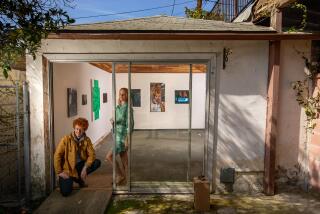Newsletter: Essential Arts: How Betye Saar’s ironing board shows racism’s dirty laundry
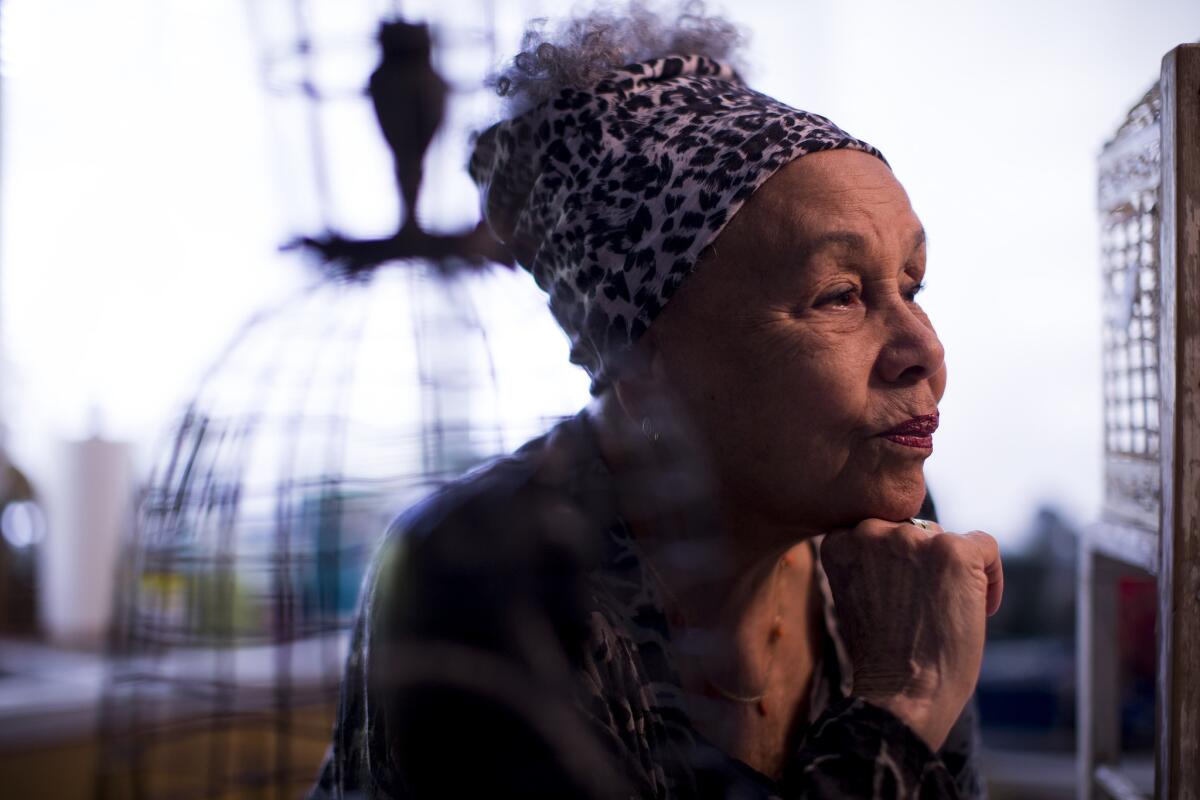
The fall arts season is in full tilt, which means museum shows, theater and bad TV. I’m Carolina A. Miranda, staff writer at the Los Angeles Times, with the week’s essential arts news and classical music chickens:
Saar’s schoolhouse
Los Angeles artist Betye Saar has a solo exhibition on view at LACMA that consists of 18 finished works, along with related sketches. It’s a small show but “size can be deceptive,” writes Times art critic Christopher Knight. The exhibition charts the artist’s creative process and serves as a lesson in art-making and the African American experience. Writes Knight: “Think of the LACMA gallery as a kind of one-room schoolhouse.”
Colony Little reviews the show for Hyperallergic: “Her practice represents the call and response between an object and the completed work, and in a musical sense, her sketches reveal all the lovely notes, melodies and harmonies in between.”
I profiled Saar back in 2016, on the occasion of her retrospective at the Scottsdale Museum of Contemporary Art. Of creating works that dealt with the experience of black women, she said: “If you are a mom with three kids, you can’t go to a march, but you can make work that deals with your anger.” In 2015, I asked why recognition for this key Los Angeles artist has been so late in coming.
In the galleries
Christopher Knight reviews “L.A. Blacksmith,” an “engaging” group show at the California African American Museum. Organized by jill moniz, the exhibition looks at the ways in which metalwork has been integral to the work of black L.A. artists. “The exhibition,” writes Knight, “takes an expansive view of what constitutes blacksmithing.”
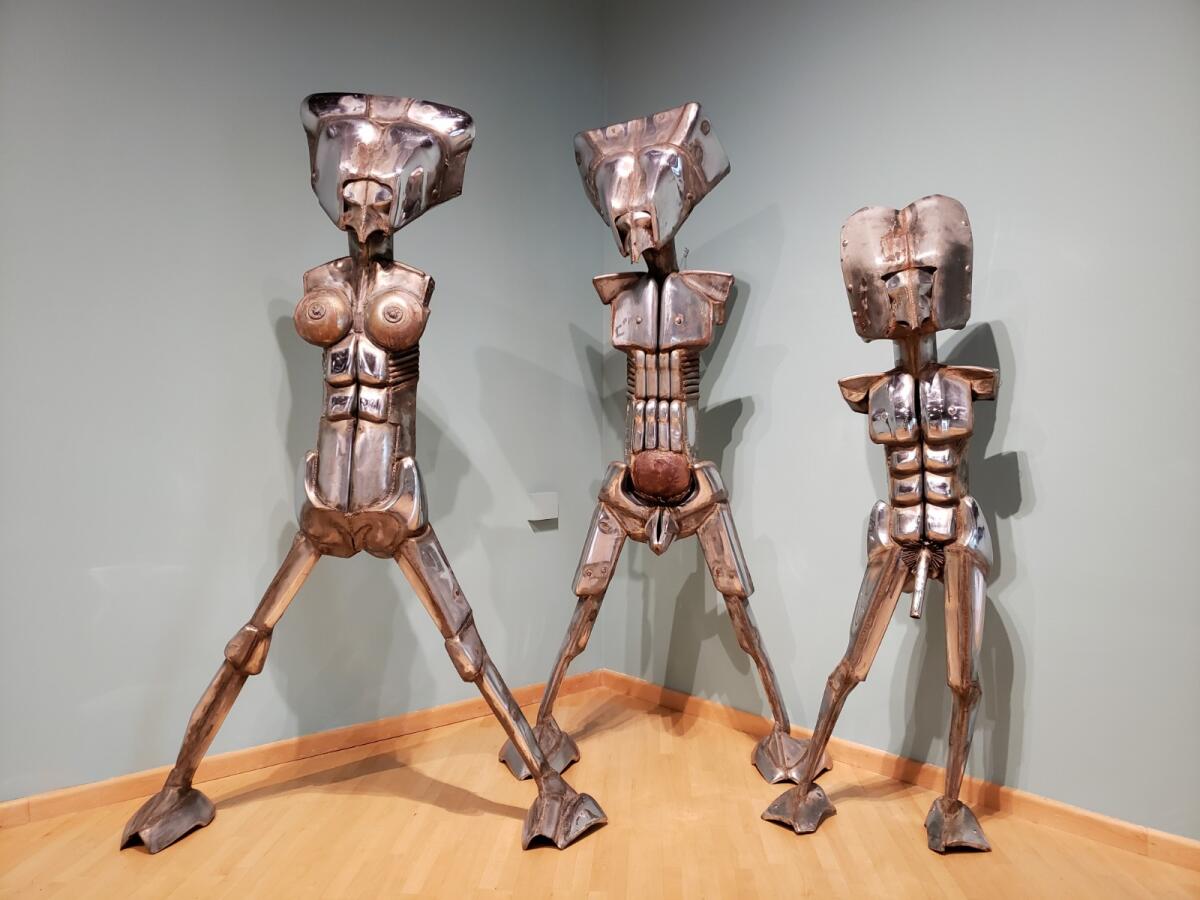
I profile painter Tala Madani, who has a solo show on view at David Kordansky Gallery. The artist creates canvases that feature hapless men and feral babies wreaking chaos, works that take on deeper emotions about yearning, fear and solitude. Her latest series explores the archetype of the crappy (literally) mother. “I am breaking, in a way, the Madonna by making her poo-y,” she tells me. “We have to get into the iconoclasm of the Madonna.”
To make his work, photographer Donn Delson takes to the air — a helicopter, to be precise. In his latest exhibition, “Holy Land,” at the Hillel at UCLA, he records the landscapes of Israel. “It’s an artistic interpretation of what I saw from the air,” he tells The Times’ Deborah Vankin, “that I thought was beautiful and inspirational.”
Amir Zaki is an artist who is also a former skater. In his new show at the Frank M. Doyle Arts Pavilion, he explores the landscape of skate parks in photographs that he pairs with images of shattered ceramic vessels, the undulating forms echoing each other. “I wanted the photos to be mysterious and contemplative,” he tells contributor Liesl Bradner.
On stage
Filmmaker Ethan Coen‘s new collection of one-acts, “A Play Is a Poem,” is at the Mark Taper Forum and Times theater critic Charles McNulty is not a fan. “The closest these five playlets come to Beckett is in the refusal of meaning to turn up,” writes McNulty. “Were it not for the filmmaking allure of the Coen name, it’s hard to imagine the Taper bothering at all with these exercises in artistic self-indulgence.”
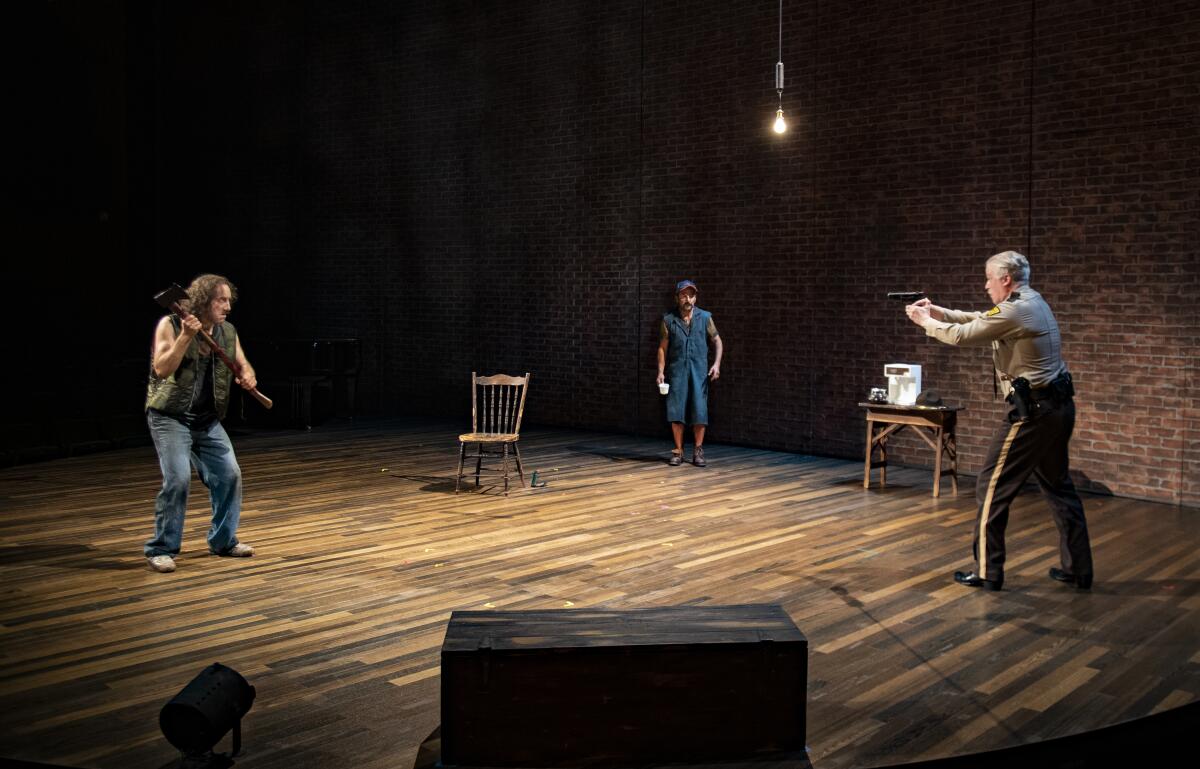
Mj Rodriguez of FX’s “Pose” is hitting the stage in a revival of “Little Shop of Horrors” at the Pasadena Playhouse. For the play’s director, Mike Donahue, it’s an opportunity to rethink a campy play as something more realistic. For Rodriguez, a trans woman, it’s a way to rethink the roles trans actors take on: “This show is speaking to all women who go through what Audrey has gone through.”
McNulty reviews this “crisp revival,” which he says “is treated with more realism than usual” with leads that “draw out the full humanity of their characters.” It is, he writes, “my favorite rendition of the show.”
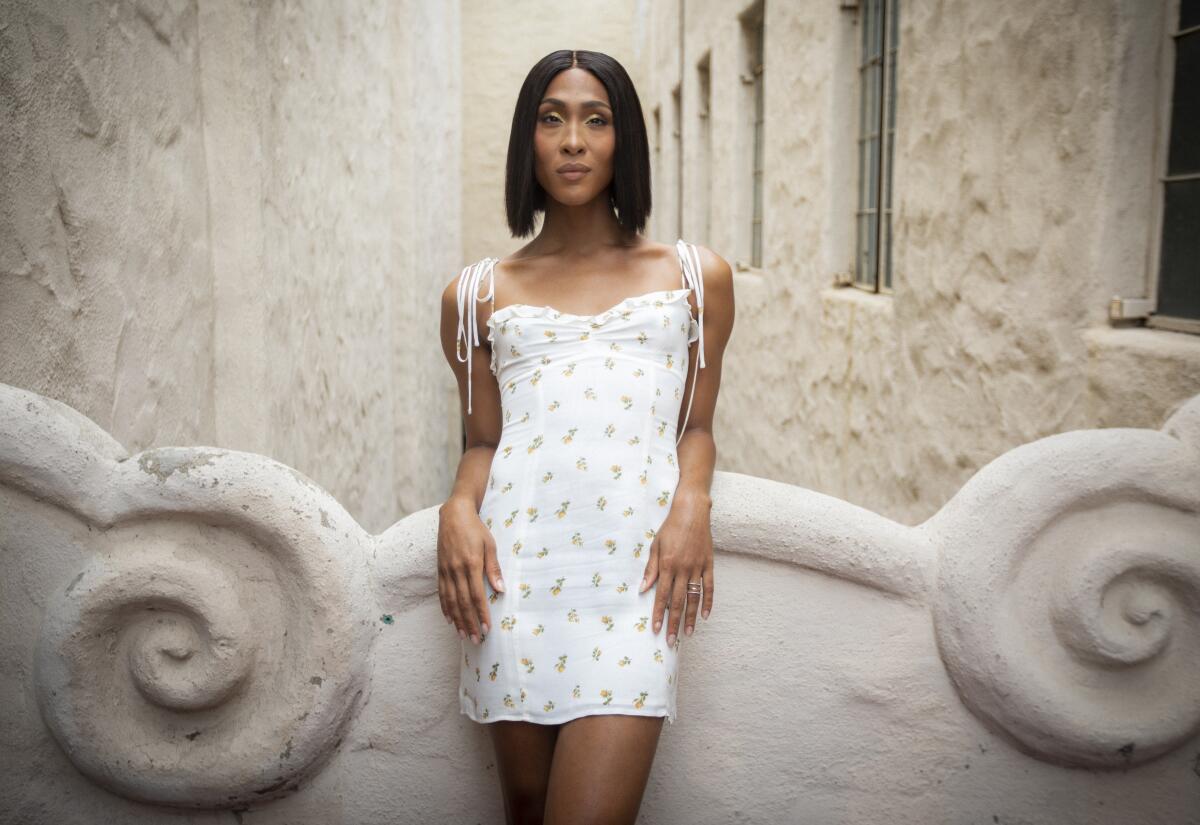
Plus, The Times’ Daryl H. Miller has a look at “Grumpy Old Men: The Musical.” “Like too many film adaptations, he writes, “this one fails to live by that old Latin maxim: First, do no harm.”
Classical notes
Plácido Domingo pulled out of the Metropolitan Opera‘s production of “Macbeth” just 24 hours before curtain. The Times’ Jessica Gelt rounds up where the various investigations on allegations of sexual harassment stand.
Critic Justin Davidson, in the meantime, offers an overview on what the Met needs to do to establish a new type of work culture: “Operatic conventions don’t die when the soprano sinks to the stage, and the dynamics of sexual power don’t vanish when one aging tenor retires a few years before he had planned.”

Genius week
The recipients of the prestigious MacArthur Fellowships — a.k.a. the “genius” grants — were announced this week. Among the California awardees was UCLA’s Kelly Lytle Hernández, a scholar focused on policing, who has studied the history of incarceration in L.A.
In the cutural arena, director Annie Dorsen, known for creating works of “algorithmic theater” — like putting eight chatbots onstage to recontextualize a 1971 debate between Michel Foucault and Noam Chomsky — was also a winner. Times theater critic Charles McNulty once noted that “Passing Strange,” which Dorsen directed, was one of the best Tony Award nominees of 2008.
Also a recipient: Oakland-based landscape architect Walter Hood, who designed the landscape around the Broad museum. The Times Deborah Vankin chats with Hood — and rounds up some of the other cultural winners, who include artists Mel Chins, Cameron Rowland and Jeffrey Gibson.
The New York Times also has a summary, which includes novelist Valeria Luiselli, poet Ocean Vuong, cartoonist Lynda Barry, guitarist and composer Mary Halvorson and choreographer Sarah Michelson.
A very Brady rebuild
I’ve been watching HGTV’s “A Very Brady Renovation,” which is transforming the interiors of the Studio City home that served as an exterior location in “The Brady Bunch” into a house that looks like a carbon copy of the sitcom’s set. It’s a truly bizarre conceit, a nostalgic re-creation of fictional architectural history, a gut and rebuild that is akin to “putting Nicolas Cage’s body with John Travolta’s face.” I also dig into the history of the architect who built the house, Harry M. Londelius.
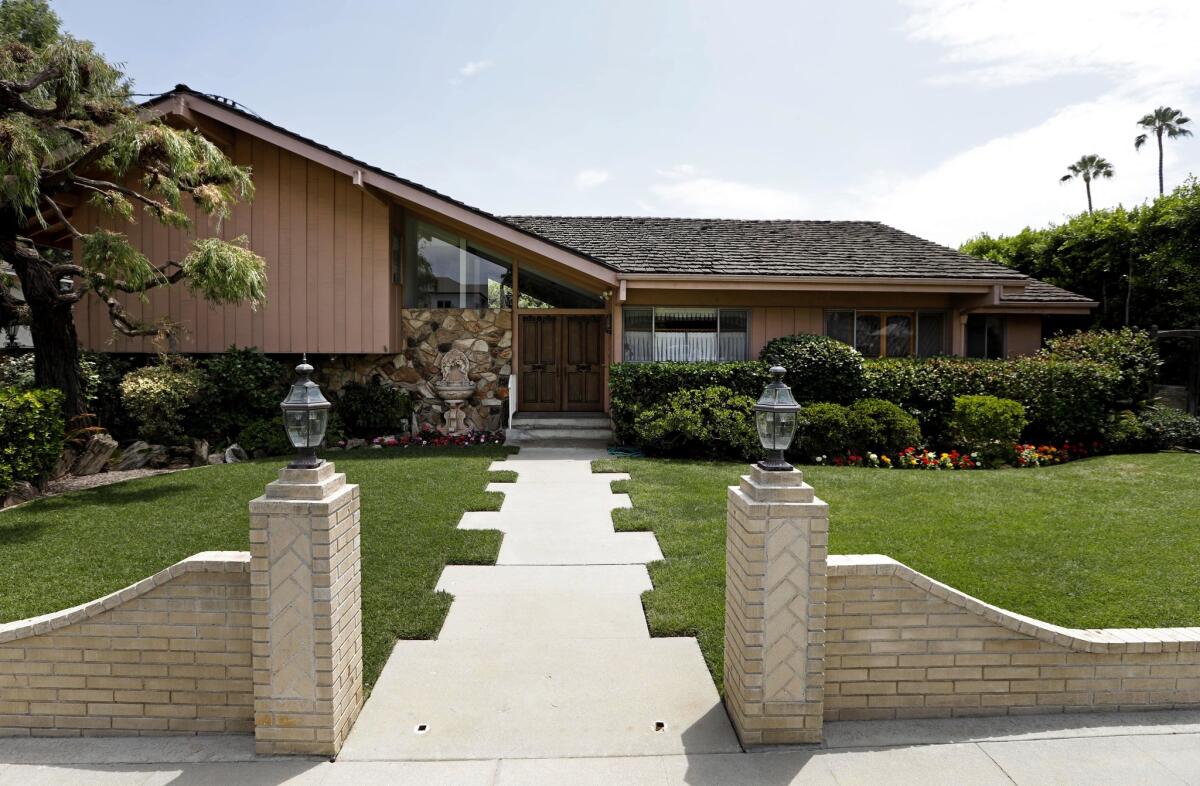
Plus: an object-by-object rundown of all the objets d’art featured in the Brady house.
Ready for the Weekend
Matt Cooper outlines everything to do in L.A. and O.C., including Jaime Martín‘s debut as music director of the Los Angeles Chamber Orchestra.
F. Kathleen Foley rounds up what’s good in small theaters, including a play about an Armenian women’s rights activist from the early 20th century.
I round up all the art happenings in my weekly Datebook, including the opening of L.A. painter Lari Pittman‘s retrospective at the Hammer Museum.
Your support helps us deliver the news on culture — and this newsletter. Subscribe to the Los Angeles Times.
In other news..
— L.A. artist Rafa Esparza chipped himself out of a concrete column in front of the White House.
— The Getty has acquired 35 works by the late photographer Laura Aguilar.
— The Orange County Museum of Art has broken ground on its new building site.
— An Artnet survey finds that female artists have made little progress in museums since 2008...
— ...and artist Adrian Piper has things to say about that.
— Employees of the New Children’s Museum in San Diego have filed a petition to unionize.
— A bronze library sculpture from L.A. has turned up in Arizona.
— Great read: Critic Karrie Jacobs revisits the High Line Park in Manhattan on the occasion of its 10th anniversary.
— More great reads: Matt Stromberg on the Second Home Serpentine Pavilion‘s meh programming lineup.
— The Griffith Park Shakespeare Festival is getting a permanent stage.
— Bruce W. Ferguson, a writer and curator who served as president of Otis College of Art and Design, and was the founding director of SITE Santa Fe, has died at 73.
And last but not least...
Pachelbel’s Canon played on a rubber chicken.
More to Read
The biggest entertainment stories
Get our big stories about Hollywood, film, television, music, arts, culture and more right in your inbox as soon as they publish.
You may occasionally receive promotional content from the Los Angeles Times.


